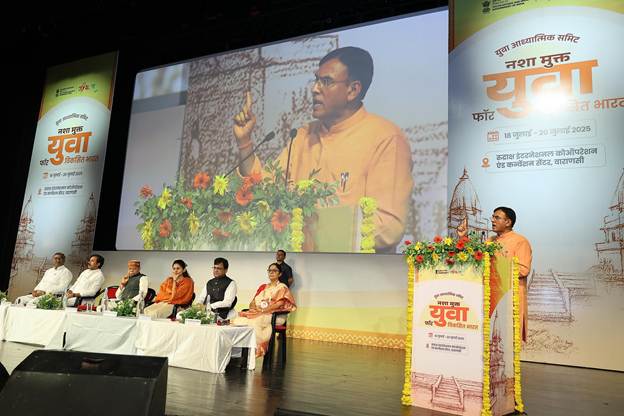Kashi Declaration for Drug-Free India launched at Youth Spiritual Summit in Varanasi

IN NEWS:
Kashi Declaration for Drug-Free India launched at Youth Spiritual Summit in Varanasi
UPSC STYLE ANALYSIS
- Event Overview:
- The Youth Spiritual Summit, held under the theme “Nasha Mukt Yuva for Viksit Bharat”, concluded at the Rudraksh International Convention Centre, Varanasi.
- The summit culminated in the adoption of the Kashi Declaration for Drug-Free India, a comprehensive framework to mobilize youth and spiritual organisations in combating substance abuse.
- Organisers and Participants:
- Organised by the Ministry of Youth Affairs and Sports (MoYAS).
- Brought together over 600 youth leaders from 120+ spiritual and socio-cultural organisations, along with policymakers, academicians, and experts.
- Focus Areas of the Summit:
- The four thematic plenary sessions explored:
- Psychological and social impacts of substance abuse.
- Drug trafficking and supply-chain challenges.
- Grassroots awareness and community participation.
- Role of spiritual and cultural institutions in prevention and rehabilitation.
- The four thematic plenary sessions explored:
- Kashi Declaration Highlights:
- Envisions a drug-free India by 2047, rooted in spiritual and cultural values.
- Recommends:
- A whole-of-government and whole-of-society approach.
- Establishment of a Joint National Committee for inter-ministerial coordination.
- Annual progress reports to monitor implementation.
- A national digital platform connecting affected individuals with support and rehabilitation networks.
- Emphasizes spiritual empowerment and community engagement as key tools in addressing addiction.
- Leaders’ Statements:
- Dr. Mansukh Mandaviya (Union Minister for Youth Affairs and Sports):
- Described the Kashi Declaration as a “collective Sankalp (resolve)”, blending reflection with national action.
- Emphasized that spiritual institutions must lead the Maha Abhiyan for Nasha Mukt Bharat.
- Shiv Pratap Shukla (Governor of Himachal Pradesh):
- Referred to Kashi as the “cradle of Sanatan Chetna”, linking values and discipline to nation-building.
- Urged that a youth-driven nation cannot afford the burden of addiction.
- Dr. Mansukh Mandaviya (Union Minister for Youth Affairs and Sports):
- Government Representation:
- Dignitaries included Virendra Kumar, Gajendra Singh Shekhawat, Anil Rajbhar, Nityanand Rai, and Raksha Nikhil Khadse.
- The event aligned with the MY Bharat (Mera Yuva Bharat) framework, mobilizing volunteers for awareness and pledge campaigns nationwide.
- Strategic Vision:
- The Kashi Declaration serves as a national policy roadmapcombining:
- Spiritual leadership,
- Public health frameworks, and
- Youth mobilisation.
- Its progress will be reviewed at the Viksit Bharat Young Leaders Dialogue 2026, ensuring monitoring and accountability.
- The Kashi Declaration serves as a national policy roadmapcombining:
STATIC PART (FOR UPSC REVISION)
- MY Bharat (Mera Yuva Bharat):
- A government initiative to institutionalize youth engagement in nation-building.
- Promotes volunteerism, civic action, and leadership among young citizens.
- Nasha Mukt Bharat Abhiyan (NMBA):
- A flagship initiative under the Ministry of Social Justice and Empowerment.
- Focuses on awareness, counselling, treatment, and rehabilitation to eliminate substance abuse.
- Role of Spiritual Institutions:
- Serve as community anchors for behavioural transformation and value-based awareness.
- Provide rehabilitative guidance rooted in India’s spiritual traditions.
- Varanasi (Kashi):
- Recognized as a spiritual capital of India, symbolizing cultural continuity and ethical revivalism.
- Frequently hosts national-level youth and cultural summits aimed at value-based social reform.
Updated – 21 Jul 2025 ; 11:15 AM | News Source: DD News